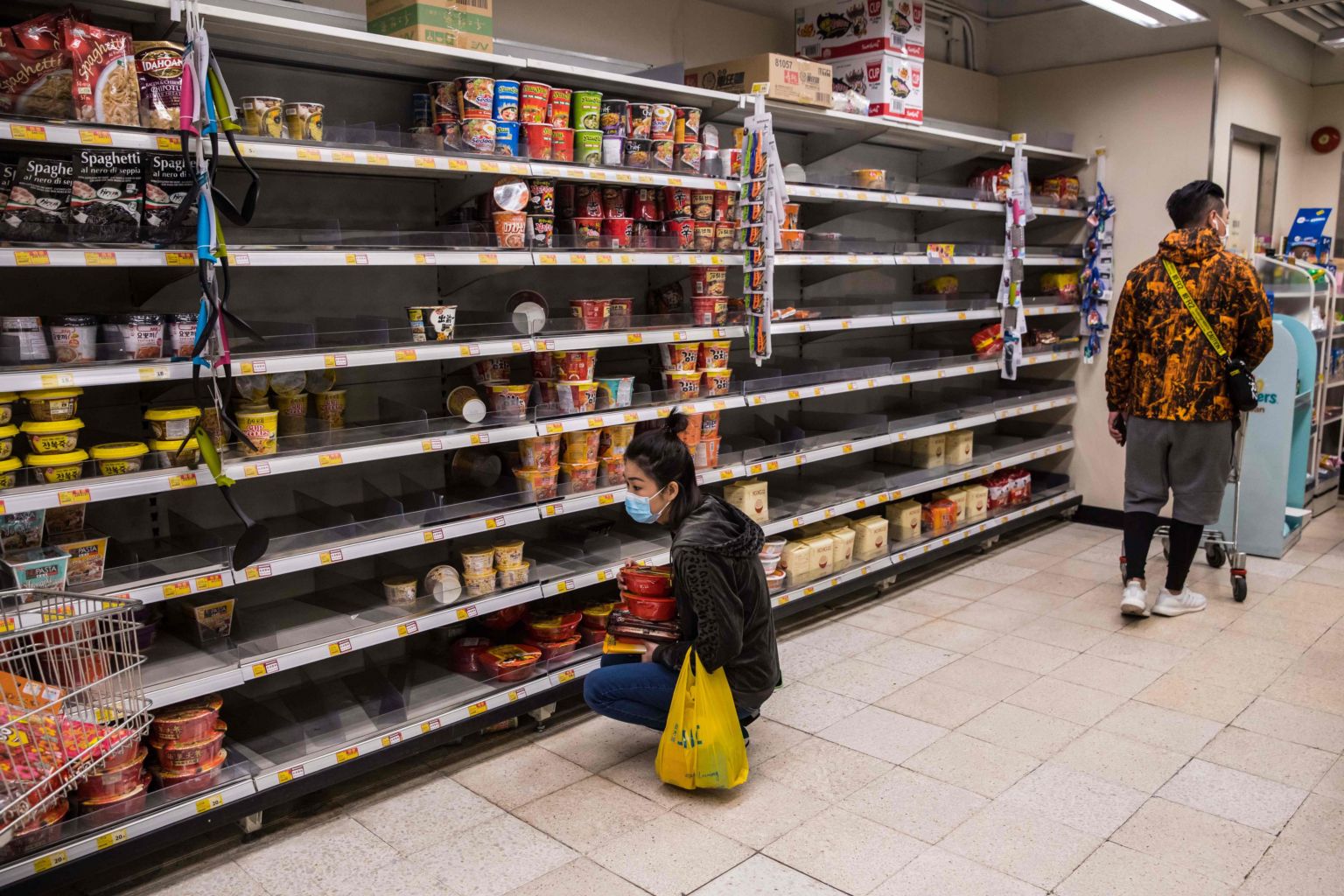Wuhan virus: Outbreak brings public trust in Hong Kong government closer to edge
Sign up now: Get ST's newsletters delivered to your inbox

Concerns about the virus outbreak have prompted shoppers to sweep not just surgical masks off the shelves but also food items like instant noodles.
PHOTO: AFP
HONG KONG - Pressure is mounting on already strained ties between the Hong Kong government and residents as fears continue to heighten and divide the community, amid the outbreak of a new deadly virus from Wuhan.
Trade unions in the city representing hospital and rail workers, among others, are threatening strikes - a move to pressure the government into shutting all borders with mainland China to stop the spread of the virus.
Pan-democracy district councillors have slammed measures rolled out by Hong Kong leader Carrie Lam as "inadequate", urging the government to fully seal all borders to mainland visitors. They said full closure of all borders would deter the spread of the virus and reduce the workload of hospital staff.
On Thursday (Jan 30), pro-Beijing lawmaker and executive councillor Regina Ip urged the government to temporarily stop all mainland tourists from coming into Hong Kong.
"Although the mainland authorities have already announced they will stop issuing the individual visit permits (to Hong Kong), the government should talk to the mainland authorities to stop allowing them to enter," she said.
The Chief Executive had announced on Tuesday that all cross-border rail routes between the mainland and Hong Kong will be suspended from midnight on Thursday. Services at six of 14 border checkpoints will be stopped to prevent further spread of the virus, along with the high-speed rail line and the original rail line to Guangzhou.
Four local airlines - Cathay Pacific Airways, Hong Kong Airlines, Cathay Dragon and Hong Kong Express - will halve flights between Hong Kong and 24 mainland cities to about 240 flights weekly from Thursday.
Hong Kong has banned the entry of people from the Chinese province of Hubei, of which its capital, Wuhan, is at the epicentre of the outbreak, since midnight on Monday.
As at Wednesday night, some 1,600 people from Hubei were turned away by the immigration authorities. This does not apply to returning Hong Kong residents.
Associate Professor Sing Ming of the Hong Kong University of Science and Technology believes the outbreak will "definitely" further undermine the already fragile public confidence in the Hong Kong government.
There is widespread perception that the government has been too sluggish to counter the outbreak and the spread of the virus, he said.
"(There has been a) series of blunders and misgovernance on the part of Hong Kong, and the widespread perception that Beijing has been interfering with the measures that the Hong Kong government can adopt to counter the epidemic.
"I think these will only strengthen the determination of some of the Hong Kong people, including the middle class, to emigrate out of Hong Kong in the medium and long run, and that would be a very important hit to Hong Kong's long-term vitality in both the economic and social senses," warned Prof Sing.
Associate Professor Alfred Wu of the Lee Kuan Yew School of Public Policy thinks the pro-democracy demonstrations that have gripped the city for over seven months will go on despite worries over the spread of the new coronavirus.
He pointed out that the root causes of the political crisis remain, and the outbreak may temporarily stop people from gathering but not for long.
Asked if the government can turn the current situation around to their favour, Prof Wu said that hinges on the government's action or inaction.
"Mistrust between the government and the public could worsen due to different reasons. (As it is) some people have questioned the government's transparency in handling the situation."
With the severe acute respiratory syndrome (Sars) outbreak in 2003 still fresh in people's minds, long queues formed outside pharmacies on Thursday morning as residents rushed for limited supplies of surgical masks.
At different shops in the city, including Kowloon Tong, Tin Shui Wai and Tseung Kwan O, thousands waited for hours to get their hands on the limited packets of masks on offer, leaving many disappointed and angry.
Concerns about the virus have prompted shoppers to sweep not just surgical masks, disinfectant wipes and hand sanitisers off the shelves but also instant noodles and frozen food as people start hoarding supplies.
As of Friday morning, the Hong Kong authorities have confirmed 12 cases of the Wuhan coronavirus.
As of Thursday, nearly 7,700 people across China have been infected, the majority in and around Wuhan, with the death toll rising to 170.

